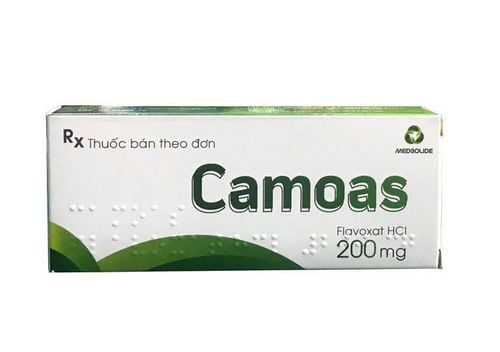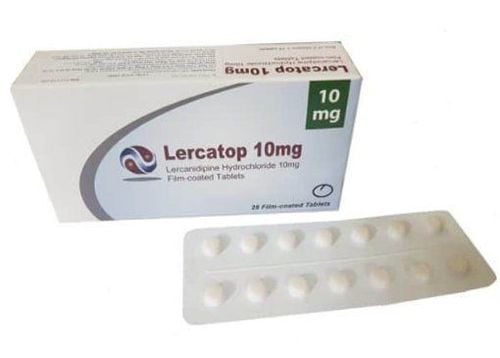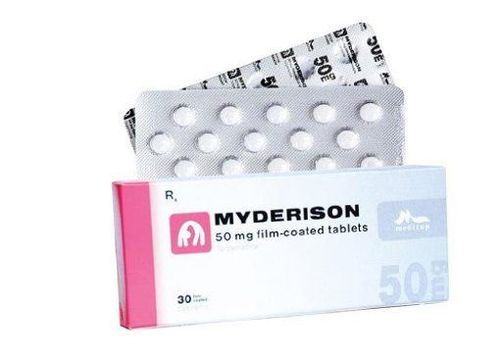This is an automatically translated article.
Mestinon drug belongs to the group of drugs for the treatment of neuromuscular disorders, is made in the form of sugar coated tablets. The drug has the main ingredient is pyridostigmine bromide, used to treat myasthenia gravis, intestinal obstruction caused by paralytic ileus, urinary retention after surgery, ...
1. What are the uses of Mestinon?
Mestinon medicine contains pyridostigmine 60mg ingredient. Pyridostigmine is an inhibitor of cholinesterase - the enzyme that helps break down acetylcholine. The effects of Mestinon are briefly described as those of a naturally occurring acetylcholine.
Mestinon is indicated for:
Treatment of myasthenia gravis; Treatment of intestinal obstruction due to paralytic ileus; Treatment of urinary retention after surgery. Mestinon is contraindicated in the following cases:
Hypersensitivity to active ingredients and excipients of the drug; Mechanical obstruction of the urinary or gastrointestinal tract; In combination with non-depolarizing muscle relaxants (suxamethonium).
2. How to use and dose Mestinon
2.1 How to take Mestinon is taken orally. The drug is only available in the form of 60mg sugar coated tablets, which cannot be broken.
2.2 Dosage When taking Mestinon, patients should be aware that the full effect of the drug will appear gradually, usually within 15-20 minutes.
Dosage for myasthenia gravis:
Adults: Take a dose of 30 - 120mg, divided into several times a day until the maximum effect of the drug is achieved (eg: Take the drug in the morning after waking up) , drink before meals). The maintenance time of a dose is usually 3-4 hours during the day, can last about 6 hours if taken before sleeping. The total daily dose is usually 5 - 20 tablets or more (depending on the doctor's prescription); Children: Children under 6 years of age use the starting dose of 30mg; Children 6-12 years old use 60mg dose. The dose should be increased gradually, increasing by 15-30mg per day until maximum effect is achieved. The total daily dose for children is 30 - 360mg. Dosage for intestinal obstruction due to bowel paralysis or urinary retention after surgery:
Adults: The usual dose is 60-240mg/day; Children: The usual dose is 15 - 60mg/day. The frequency of administration may vary depending on the individual patient's needs. Dosage for special populations:
Elderly: There is no specific dosage recommendation for the elderly; Patients with renal failure: Mestinon is mainly excreted unchanged by the kidneys, so it is necessary to reduce the dose for people with kidney disease, adjust the dose to achieve therapeutic effect; Patients with hepatic impairment: There are no specific dosing recommendations for patients with hepatic impairment. *Note: The above Mestinon dosage is for reference only. The doctor can prescribe the appropriate dose for the patient depending on the condition and the progress of the disease.
Overdose: If the patient takes an overdose, the patient should contact the doctor and go to the nearest hospital for treatment. If the patient's respiratory function is severely impaired, artificial respiration is required. Simultaneously, intravenous administration of 1 - 2 mg of atropine sulfate may relieve muscarinic symptoms. This dose may be repeated every 5-30 minutes if necessary.
Missed dose: If you miss a dose of Mestinon, patients should take it immediately when they remember, take the next dose as prescribed. If 2 or more doses are missed, the patient should contact their doctor for instructions.
3. Side effects of the drug Mestinon
When using Mestinon, patients may experience some unwanted side effects such as:
Eyes: Dilated pupils, disordered eye accommodation, increased tear secretion; Cardiac: Arrhythmia, hypotension, syncope; Respiratory: Increased secretion of bronchial fluid accompanied by bronchospasm; Skin: Urticaria (usually disappears after discontinuation of the drug), increased sweating; Musculoskeletal: Muscle weakness, tremor, myasthenia, muscle spasticity; Kidneys and urinary tract: Urgent urination. When experiencing side effects of Mestinon, patients should inform their doctor immediately.
4. Be careful when using Mestinon
When using Mestinon, users should note:
Be careful when using Mestinon for people with airway obstruction (bronchial asthma, chronic obstructive pulmonary disease); Caution when using the drug for subjects: Heart arrhythmias (bradycardia, atrioventricular block), recent coronary occlusion, hypotension, parasympathetic hypertrophy, gastrointestinal ulceration, hyperthyroidism thyroid, epilepsy or Parkinson's; Patients with myasthenia gravis receiving a large dose of Mestinon may require additional oral atropine or anticholinergic drugs to partially neutralize the effects of muscarinic; It should be borne in mind that the possibility of cholinergic symptoms from an overdose of Mestinon or from a possible worsening of the disease. Both of these symptoms have in common: Increased muscle weakness. In the event of cholinergic symptoms, treatment should be discontinued immediately and appropriate supportive measures (including respiratory support) instituted; The need for Mestinon is significantly reduced after thymectomy or with certain other therapies (immunosuppressants, steroids); People with galactose intolerance, glucose-galactose malabsorption or lapp lactase deficiency should not take this medicine; Because the use of Mestinon drug can cause accommodation disorders of the eyes, visual impairment, so care should be taken when driving and operating machinery; Mestinon should be used with caution in pregnant and lactating women.
5. Mestinon drug interactions
Some Mestinon drug interactions patients need to pay attention to:
Immunosuppressants: The need for pyridostigmine bromide (a component of Mestinon drug) may be reduced when using other treatments (steroids or inhibitors). immunity); Methylcellulose: Methylcellulose and drugs containing this excipient may completely inhibit the absorption of pyridostigmine bromide; Antimuscarinics: Atropine and hyoscine antagonize the muscarine action of the active ingredient pyridostigmine bromide. Gastrointestinal motility is reduced because these drugs may affect the absorption of pyridostigmine bromide; Muscle relaxants: Pyridostigmine antagonizes the effects of non-depolarizing muscle relaxants. In addition, pyridostigmine may prolong the effects of depolarizing muscle relaxants; Other drugs: Local or general anesthetics/anesthetics, aminoglycoside antibiotics, antiarrhythmics, some drugs affecting neuromuscular transmission,... can all affect pyridostigmine. bromide. When taking Mestinon, patients should inform their doctor about the drugs they are using to receive appropriate advice and avoid drug interactions. If you experience any adverse side effects, you should also inform your doctor right away.
Mestinon drug belongs to the group of drugs for the treatment of neuromuscular disorders, is made in the form of sugar coated tablets. The drug has the main ingredient is pyridostigmine bromide, used to treat myasthenia gravis, intestinal obstruction due to paralytic ileus, urinary retention after surgery, .. To ensure effective treatment and avoid side effects, patients need to use it. prescription drugs or consult a doctor, pharmacist for advice.
Follow Vinmec International General Hospital website to get more health, nutrition and beauty information to protect the health of yourself and your loved ones in your family.
Please dial HOTLINE for more information or register for an appointment HERE. Download MyVinmec app to make appointments faster and to manage your bookings easily.













